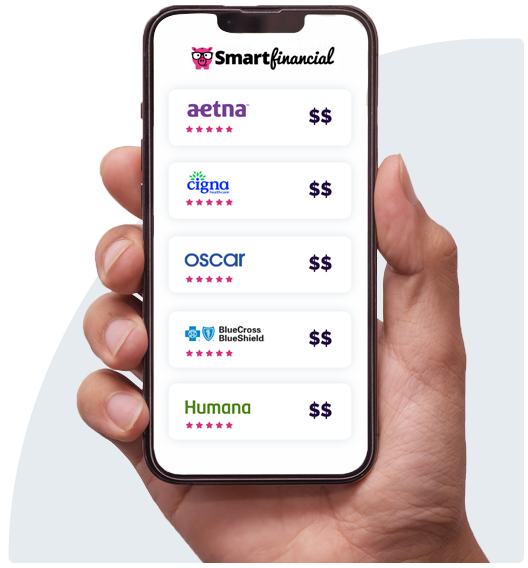Having health insurance for you and your family is already a given but you shouldn’t have to pay more than you have to. However, with insurance companies using different pricing methods and market factors like inflation and the cost of medical services in constant flux, it can be hard to know if you’re overpaying for health insurance. That’s where shopping around comes in.
Comparison shopping can help you sort through the different pricing variables and find the best premium possible for health insurance.
Comparing Health Insurance Rates the Traditional Way
If you’re not insured through your or your spouse’s employer, you’ll need to shop for health insurance on the federal health exchange or your state’s equivalent, which can be confusing to navigate. Before explaining how SmartFinancial simplifies the shopping process, let’s review the (tedious) steps of shopping around the traditional way.
Step 1: Decide How Much Coverage You Need
Marketplace plans can no longer have an annual limit on coverage for essential health benefits so you will not need to factor that into your research like you would when shopping for renters or auto insurance. Instead, you will need to look at coverage scope, such as buying insurance for otherwise excluded benefits, like vision or dental coverage.
In addition, you will want to determine what coverage you want for out-of-network services and consider the size of an insurance company’s provider network. If you want to go out of network and still have some coverage, you may want to buy a more expensive PPO plan. On the other hand, if you’re fine with having access to a smaller network and not having any out-of-network coverage, then a more affordable HMO plan may be preferable.
Step 2: Make Sure You Have the Right Information and Documentation
Getting accurate prices and pinpointing the most relevant coverage options begins with having the right information and documentation, which includes the following:
- Zip code
- Number of dependents
- Coverage start date
- Coverage needs
- Current primary care physician (if you want to confirm if they are in the new insurance company’s network)
- Whether you’re fine with generic drugs or need specialty drugs
Step 3: Research Insurance Companies
Entering your information on the marketplace website will return a list of health insurance plans, each with its own premiums, copays, coinsurance, deductibles and benefits. In addition, you should notice mentions of different metal tiers: bronze, silver, gold and platinum. These categories dictate your premium and out-of-pocket costs, with bronze plans having the lowest monthly premium and the highest out-of-pocket costs and platinum plans having the highest monthly premium and lowest out-of-pocket costs.
In general, bronze plans are preferred for younger and healthy people since they are unlikely to visit the doctor frequently and can enjoy more affordable rates. Platinum plans are recommended for those who require frequent medical care and prescription drug refills and want to minimize copays and coinsurance payments.
Additionally, if there’s a specific doctor or specialist you want to continue seeing, then you will need to confirm that they are within the network of whichever insurance company you’re considering. Each health insurance company should have a database of in-network doctors and hospitals on their website that you can reference.
The SmartFinancial Way To Compare Health Insurance
Sorting through dozens or more of health insurance plans can be daunting, especially if you encounter unfamiliar terms. Who wants to spend even more time researching? On top of that, you’re on a ticking clock since open enrollment only lasts a few months.
Good news for you: SmartFinancial makes it fast and simple to shop for health insurance.
With SmartFinancial, you complete a single questionnaire and based on your answers, we match you with a policy that can meet your coverage needs and budget. No need for endless scrolling or looking up unfamiliar words. The best part: This service is 100% free.
How SmartFinancial Works
1
Complete a Quick Questionnaire We’ll ask you questions about yourself like your age and sex, what coverage you want and if you have any dependents.
2
Compare Rates We’ll analyze offers from over 200 insurance companies large and small and narrow them down to only the best and most relevant options.
3
Find Coverage Choose the health plan that best fits your coverage needs and budget. Simple, quick and 100% free, of course.
Factors That Affect How Much You Pay for Health Insurance
When it comes to marketplace plans, health insurance companies are allowed to base your premium using only the below five factors:
- Location: Where you reside plays a significant role in determining your premium, as healthcare costs can vary by region.
- Age: Older individuals with more involved healthcare needs generally pay higher premiums than young and healthy individuals.
- Tobacco use: If you use tobacco products, expect an increase in your premium to reflect the associated health risks.
- Plan category: The metal tier you choose affects your premium and out-of-pocket costs.
- Number of dependents: Family coverage tends to be more expensive than individual coverage since more people are being insured.









 Editorial Standards
Editorial Standards 








